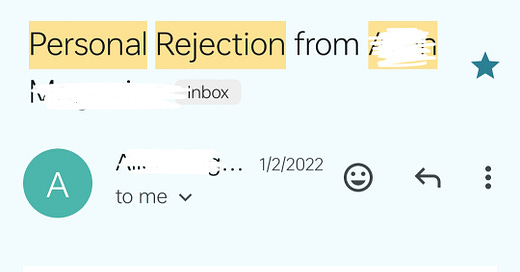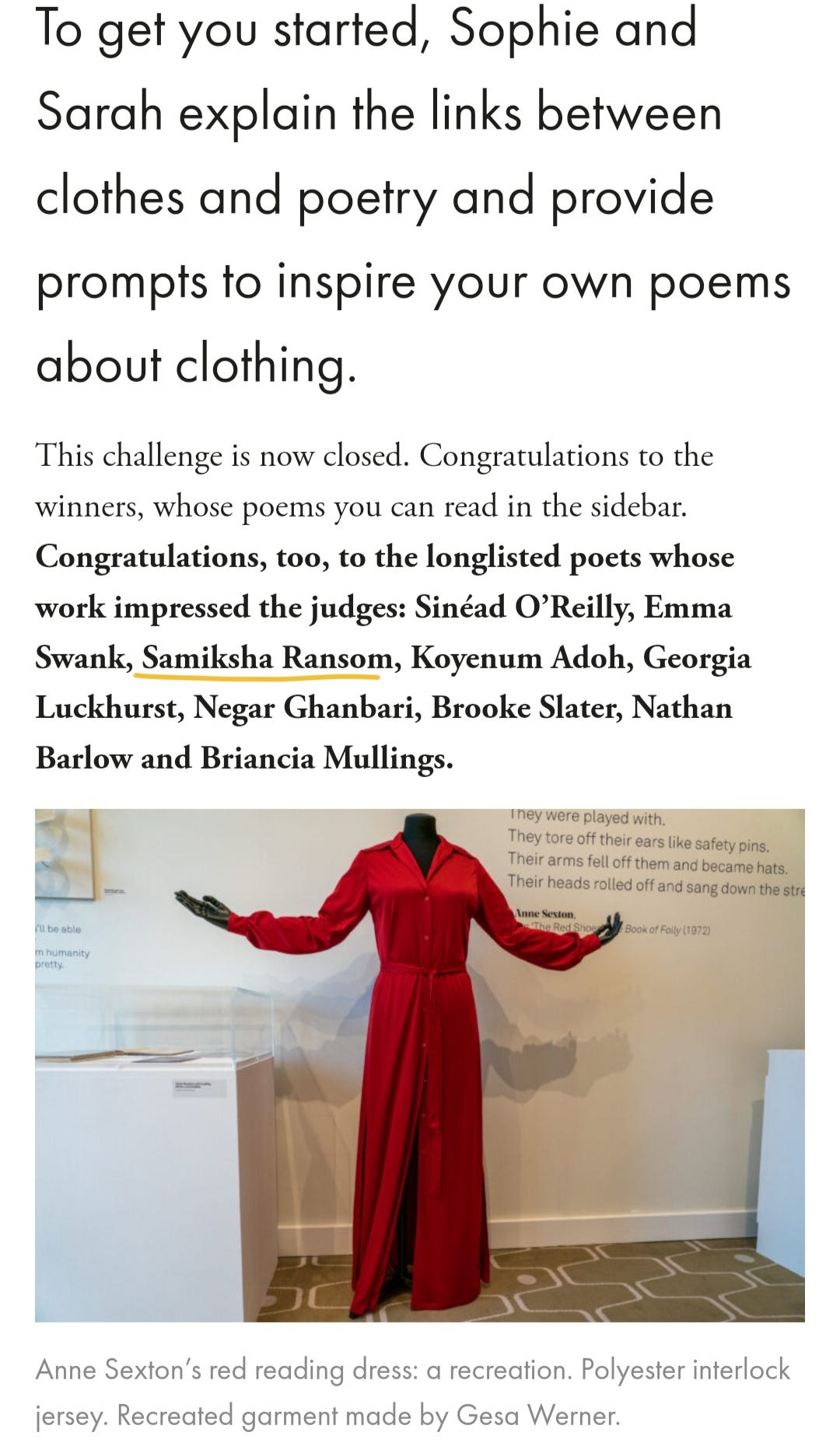Hi, there!
If you’re venturing out into the world of publishing and are eager to submit your work to literary magazines, I have an unfortunate prediction for you: rejections. Lots of rejections. I don’t say this to scare you, but rather to let you know that it’s okay, and rejections in this industry are a given, no matter how good you are. I’d go to the extent of saying that if you’re not getting enough rejections, you’re doing it wrong. OR. You’re Margaret Atwood. But I’m pretty sure, starting out even she got rejections.
Today, I want to talk to you about rejections when it comes to getting published in literary magazines, what each rejection means, and how you should respond. And by the way, before you submit your work, you should read my letter, How to decide which literary magazines to submit to which has stellar tips on making submission decisions and will save you a ton of effort because these are lessons I’ve learnt through years of submitting.
So now that you’ve decided which magazine you must submit to, let’s talk about rejections. Broadly, there are two kinds of rejections: form rejections and personal rejections. But there are other types of rejections too. Keep reading to find out.
Form rejections
Form rejections are rejections sent out in bulk to the majority of submitters whose work is being rejected. Magazines usually have rejection templates that are sent out as form rejections. Even though these rejections will name you and your submitted work, they do not include any comments about your submitted work other than extremely generic ones like, “we really enjoyed reading your work, but it is not a right fit for us at this time.”
Here’s an example of a typical form rejection (Image 1):Here’s another example of a form rejection from one of the top literary magazines (
Image 2).Personal rejections
In contrast to form rejections, personal rejections are well, personal, in some way. They include personal comments, on the quality of your work. These might not necessarily be elaborate comments or feedback, while on occasion, that could happen too. While personal rejections also hurt, they hurt a little bit less because they show that the editors liked your work, and you almost made it, but perhaps due to overall high quality of work, or limited space, they were forced to decline your piece.
Sometimes, magazines might outrightly state in the subject line that you have received a personal rejection. Here’s an example (
Image 3):
At other times, (most of the times) they might simply send you an email that says they admired your work, or that it was shortlisted.
For example, this rejection comments on the themes of my work and mentions, it came close (Image 4).Note that the above rejection (
Image 4) is from the same top literary magazine who sent me a form rejection (SeeImage 2).
Here’s another one that let me know I was shortlisted for the magazine issue.
(Image 5):
Confusing rejections
These say sooo little about your work and are so generic in their approach, that it’s hard to make out whether or not they are personal rejections. Here’s an example (
Image 6):
I’m not sure if they really mean it or if they’re just being polite.Acceptances that are as good as rejections
Well, this one is kind of funny in retrospect, but at the time, NOT AT ALL. It’s when you submit your work to a magazine, wait for a long period of time, and when you finally hear back from them, they break the good news: Congratulations! We loved your submission. Your work has been accepted…bla bla… You’re happy, you post the acceptance letter on social media, friends congratulate you and months pass, but your work does not get published. In other words, the magazine just decides to ghost you.
NGL, happened with me. At the time I was a younger writer, and later made peace with the fact that that poem wasn’t exactly my best poem either. So, ultimately, I wasn’t bothered too much about it, and haven’t tried to publish the poem either.Here’s an example (
Image 7):
P.S. This could look like any other acceptance letter.Rejection from your end (Yes, that might happen too)
This is when your work gets accepted for publication in a lit mag, but after reviewing the terms of the contract/publication, you might choose to forego publication. This kind of decisions vary from artist to artist. But a good tip to keep in mind is that selling most rights to your work to a publication such that you need to ask permission from them to use your own work in the future, might not be the best decision.
Curt rejections
These are short and impolite. If you google the definition of ‘curt,’ it says, ‘briefly rude.’ That’s exactly what this rejection is, though it most likely wasn’t intended to be. Your editor is probably just overworked and frustrated about having to send too many emails. Nevertheless, I’d encourage editors to use form rejections, which are polite and just as easy to send.
Here’s an example (Image 8):A Note on Contests
Contests are tricky and multiple scenarios are possible. You might win, get shortlisted, longlisted, receive an ‘honorable mention’ or your work might be picked up as ‘Editor’s Pick.’
For example, even though I did not win, my work got longlisted for the ‘Poets in Vogue’ challenge by the Young Poets Network, UK. Though they published my name on the website, they did not publish my work. (Image 9)In another case, though I did not win the Colorism Healing Writing Contest 2020 organized by Dr. Sarah Webb, my work was chosen as ‘Editor’s Pick’ and published in an anthology by the same name (
Image 10). View anthology here.
9. Self-rejection
There is one last type of rejection. Of all possible rejections, this is the worst. It’s when you don’t submit your work to any literary journal or magazine at all because you think it’s not good enough and doesn’t have a shot anyway. Self-rejection is your surest, most final rejection. Avoid it at all costs.HOW SHOULD YOU RESPOND TO REJECTION?
Honestly, you should be proud of all your rejections from literary magazines and publishers because at this point, you’ve already gotten over the worst kind of rejection: self-rejection. You must be even prouder of personal rejections and flaunt them. Anyone who knows what publishing is like, will know personal rejections are also to be treasured.
Finally, it takes courage and bravery to send your work out into the world, and I hope this letter will make the task a little bit easier for you. If you liked what you read and found it useful, please consider subscribing to my newsletter, which is completely free today. You can also show your support and Buy Me a Coffee here. Alternatively, you can share this newsletter with a friend who needs it, leave me a comment, or simply reply to this email and have a chat with me about rejections and all things literary! I’d love to hear your rejection stories so we can support each other!
If you prefer Instagram, you can connect with me hereSee you soon!
XOXO!












